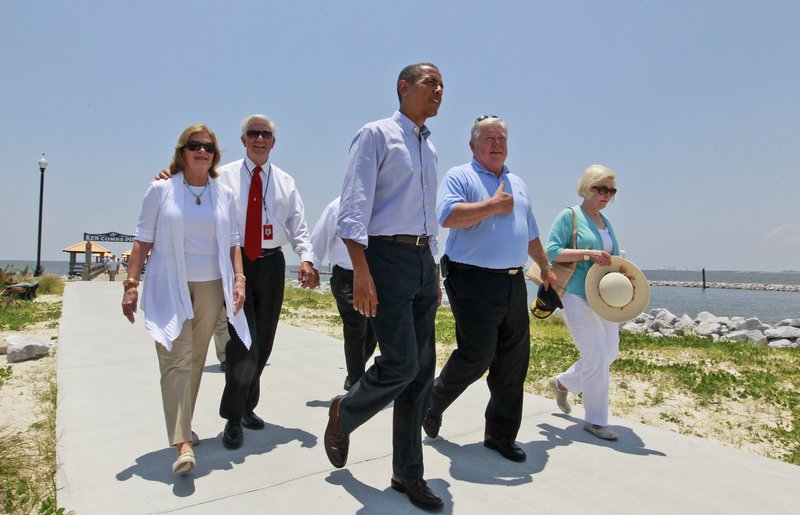THEODORE, Ala. – In a newly optimistic tone, President Obama promised Monday that “things are going to return to normal” along the stricken Gulf Coast and the region’s fouled waters will be in even better shape than before the catastrophic BP oil spill.
He declared Gulf seafood safe to eat and said his administration is redoubling inspections and monitoring to make sure it stays that way. And his White House said Monday it had wrested apparent agreement from BP PLC to set up an independent, multibillion-dollar compensation fund for people and businesses suffering from the spill’s effects.
Obama declared, “I am confident that we’re going to be able to leave the Gulf Coast in better shape than it was before.”
That pledge was reminiscent of George W. Bush’s promise to rebuild the region “even better and stronger” than before Hurricane Katrina in 2005. Bush could not make good on that promise, and Obama did not spell out how he would fulfill his.
With Obama hoping to convince a frightened Gulf Coast and a skeptical nation that he is in command, he is marshaling the tools at a president’s disposal: a two-day visit via Air Force One, helicopter and boat in the region, a prime-time speech tonight from the symbolically important stage of the Oval Office, and a face-to-face White House showdown Wednesday with the executives of the oil company that leased the rig that exploded April 20 and led to the leak of millions of gallons of crude.
From an enormous waterside staging facility here, one of 17 where cleanup crews ready themselves and equipment to attack the spill, Obama mixed optimism about the ultimate result with warnings that the recovery could take a while.
“I can’t promise folks here in Theodore or across the Gulf Coast that the oil will be cleaned up overnight. It will not be,” he said, after encouraging hard-hatted workers as they hosed off and repaired oil-blocking boom. “It’s going to be painful for a lot of folks.”
On the Gulf Coast on Monday, one focus of Obama’s remarks was the region’s seafood, which faces growing doubts around the country but which Obama pronounced safe. He noted he had some for lunch — including mini crab cakes, fried shrimp and shrimp salad sandwiches — and found it “delicious.”
To further allay fears, the president announced a “comprehensive, coordinated and multi-agency initiative” to protect the seafood industry that is the pride and economic engine of the region. The effort is to include increased facility inspections and monitoring of fish caught just outside the contaminated zone.
“This is important for consumers who need to know that their food is safe, but it’s also important for the fishermen and processors who need to be able to sell their products with confidence,” Obama said. “So let me be clear: Seafood from the Gulf today is safe to eat, but we need to make sure that it stays that way.”
The administration released few details. A statement from the National Oceanic and Atmospheric Administration and the Food and Drug Administration detailed current efforts to close waters and inspect seafood but did not describe new initiatives.
Underscoring the problem, a council representing commercial and recreational fishermen met Monday in nearby Gulfport, Miss., with federal officials from the National Marine Fisheries Service and the NOAA. They complained the government has not taken enough samples of seafood.
Dangerous toxins have not been found by any of the federal agencies taking fish and seafood samples. However, the Gulf of Mexico Fishery Management Council said the agencies are slow to publish their findings — NOAA has yet to publish any — and the lack of information and transparency is raising concern with the wider public.
Already, the council said, restaurants are putting up signs informing patrons they are not serving Gulf seafood. The council expressed concern that this leaves the door open for competitors, including international ones, to enter the market.
Obama portrayed his trip through Mississippi, Alabama and Florida as vital preparation for tonight’s address and for Wednesday’s confrontation with BP executives, with the ruin brought to Gulf businesses and lives giving him valuable evidence.
He found it on a vacant beach in Mississippi, where tourists were scared off from the still-pristine stretch by the mere threat of oil that has lapped the state’s barrier islands. He found it in neighboring Alabama, where the muck has come ashore and stuck. And he found it over lunch, in the testimony of local hotel and restaurant owners who are hurting badly from the loss of customers.
“We’re gathering up facts, stories right now so that we have an absolutely clear understanding about how we can best present to BP the need to make sure that individuals and businesses are dealt with in a fair manner and a prompt manner,” the president said.
The Oval Office address, Obama’s first, is intended to detail specific and potentially expensive new steps for responding to the spill. That is expected to include an ambitious plan to restore the fragile Gulf Coast ecosystem, already battered before the leak.
The president also will argue for passage of comprehensive energy and climate change legislation.
It’s a case the president has been making repeatedly, and doing so from the Oval Office will put a much higher profile on one of his domestic priorities that has fallen by the wayside due to the difficult politics of the issue.
On the victims’ compensation fund, White House spokesman Bill Burton said the administration and BP were “working out the particulars,” such as the amount to be placed in an escrow account and how it would be administered. The account would be run by an independent third-party entity, as Obama has demanded, Burton said. And it would run into “the billions of dollars,” although he wouldn’t give a specific amount.
Send questions/comments to the editors.


